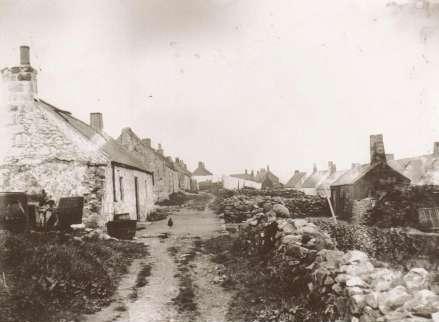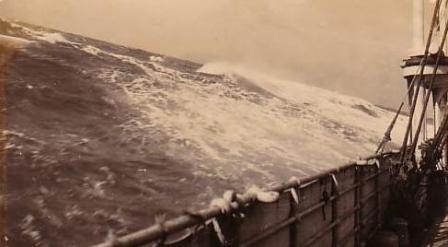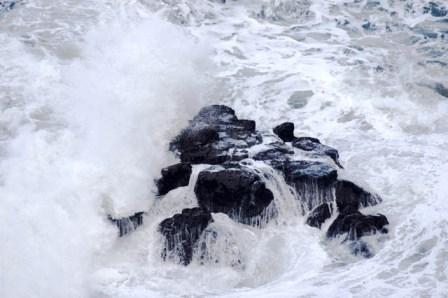
Shipwreck at Earnsheugh (1925) |
In January of this year a shipping disaster involving the Aberdeen steam trawler “Ulster” occurred at Earnsheugh Bay, Findon during a dense fog in the early hours of the morning. This is the same place where the “St. Andrews Students” came ashore in 1710. The shipwrecking of the Ulster resulted in the death of five seamen and the dramatic story is taken up, below by the following article that appeared in “The Scotsman” newspaper on 24th January 1925:
“The disaster occurred about two o'clock in the morning according to a statement by Charles Robb, the second fisherman, who before struggling to safety, had noticed the time on a small hand clock on the vessel. The Ulster had left Aberdeen about three hours before that time on a voyage to Granton for coal, and had taken all that time to cover the half-dozen miles, creeping along the edge of the coast very slowly on account of the density of the land fog, which made navigation very hazardous. It was not considered, however, that there was any danger till the vessel struck a rock, and then the swell of-the waves created more peril.
The place where the vessel struck is just about a couple of miles north of where the Portgordon steam drifter Press Home struck about a couple of months ago, with loss of more than half the crew, when returning from a very successful East Anglian herring fishing - five of the crew of eight onboard drowned, and the others being saved through the heroism of the octogenarian fisherman George Craig, who, the other day, received the King's medal for gallantry.
 In connection with the Ulster disaster deeds of heroism
have also to be recorded. The first news of the disaster came from two
of the survivors, who clambered up the cliff and sought assistance at
the farmhouse of Cairnrobin. They presented a pitiable plight, with feet
and hands bleeding and clothes torn from their strenuous struggle up a
rocky brae beside a precipice which descends 60 feet down to the sea.
They were in an exhausted condition, but immediately represented to the
farmer that one of their comrades, an elderly man, Charles Robertson,
sen., a deckhand, was in a more desperate position. They had left him
when he had crawled painfully over boulders to a place of comparative
safety, but had found himself too weak to attempt to scale to the top of
the precipice.
In connection with the Ulster disaster deeds of heroism
have also to be recorded. The first news of the disaster came from two
of the survivors, who clambered up the cliff and sought assistance at
the farmhouse of Cairnrobin. They presented a pitiable plight, with feet
and hands bleeding and clothes torn from their strenuous struggle up a
rocky brae beside a precipice which descends 60 feet down to the sea.
They were in an exhausted condition, but immediately represented to the
farmer that one of their comrades, an elderly man, Charles Robertson,
sen., a deckhand, was in a more desperate position. They had left him
when he had crawled painfully over boulders to a place of comparative
safety, but had found himself too weak to attempt to scale to the top of
the precipice.
Mr Knowles, the farmer, at once sent information to Mr G. F. Tee, station officer, who soon reached the scene by motor cycle, accompanied by Mr John Ritchie, one of the lifesaving-brigade. A long rope with buoy attached was lowered over the face of the cliff, and Robertson crawled to the place and made himself firmly attached to the buoy. The three men at the top of the cliff – Tee, Ritchie, and Alexander Craig, one of the rescued men of the doomed vessel, then pulled him to the top. He was greatly exhausted, but after receiving attention was able to be conveyed to his home at Walker Road, Torry.
The survivors were taken from the farmhouse to Cove Bay Hotel, where later, they were joined by Commander Woy, R.N., District Coastguard Inspector, and District Officer Morrison, Aberdeen, who motored them into Aberdeen. Robertson was in a state of collapse not only from his buffeting by the waves on the rocks and his crawling over boulders to a safer position, as also the peril to which he was exposed when hanging on to the rope while being hoisted to the top of the precipice, but he was overwhelmed with grief when he received the information that his son of the same name, the mate on the vessel, had been drowned. The old man, as also the others, had to be medically attended to.
The three rescued men were all below at the time their vessel struck, as they were not due for duty on deck till 4 o'clock in the morning. What happened when the vessel struck was that Alexander Craig, who has had previous experience of dealing with difficult situations in cases of shipwreck, put a rope round his waist and made an attempt to reach the rocks nearer the shore. He was, however, foiled in his attempt. Another effort by Charles Robb was more successful. He succeeded in clambering on to a rock about amidships of where the Ulster had struck, and was followed by Craig and Robertson. It may be mentioned that Craig already holds a medal, for heroism - awarded on the occasion of his saving of several lives when the Swedish steamer G. Koch was dashed on the rocks below the Girdleness Lighthouse at Aberdeen in the year before the outbreak of the war.
 Beyond the darkness of the night and the density of the
fog there is nothing apparently to account for the disaster. The stern
of the vessel is almost at the mouth of a cave, to the north of which
are the rocks known as the Partan Crags, while to the south are what are
called the Red Mantles. With bow pointing seawards, the vessel lies half
submerged on the port side, with part of the bow above water. To get
into her present position the vessel must have passed over rocks which
are submerged at high water, and it is believed the vessel had struck
one of those sunken rocks, accounting for a large hole in her stern. To
get the vessel out of her present position, practically surrounded by
rocks, will be a very difficult, if not impossible, task, in the opinion
of those best-fitted to judge”.
Beyond the darkness of the night and the density of the
fog there is nothing apparently to account for the disaster. The stern
of the vessel is almost at the mouth of a cave, to the north of which
are the rocks known as the Partan Crags, while to the south are what are
called the Red Mantles. With bow pointing seawards, the vessel lies half
submerged on the port side, with part of the bow above water. To get
into her present position the vessel must have passed over rocks which
are submerged at high water, and it is believed the vessel had struck
one of those sunken rocks, accounting for a large hole in her stern. To
get the vessel out of her present position, practically surrounded by
rocks, will be a very difficult, if not impossible, task, in the opinion
of those best-fitted to judge”.
The crew that survived were lucky in that they made the correct choice in respect to finding an escape route from the boat, all three escaping from the bow of the vessel and being able to scramble from there onto the rocks. The five men that died had made their way to the stern of the ship and attempted to escape by that route however they were caught in the surf and were washed out to sea and drowned.